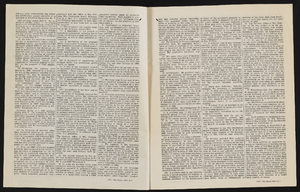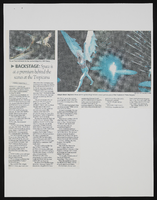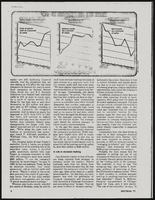Search the Special Collections and Archives Portal
Search Results
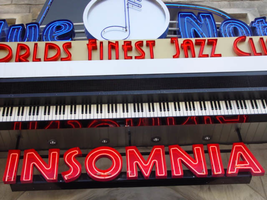
Photographs of Blue Note signs, Las Vegas (Nev.), 2002
Date
Archival Collection
Description
Site address: 3663 S Las Vegas Blvd
Sign owner: Blue Note International: Father & Son team of Danny and Steven Bensusan
Sign details: The Blue Note is located a short distance east, down Harmon Ave., on the north side of the street, facing south. It is part of the Aladdin Hotel Casino. A vacant lot resides on the corner, and is the only thing that separates the Blue Note from the Strip. Signage for the property includes two logo wall signs on the west wall of the building, a vertical blade sign and an entrance sign over the main port to the establishment.
Sign condition: Structure 5 Surface 5 Lighting 5
Sign form: Fascia
Sign-specific description: Just east off of Las Vegas Blvd, down Harmon Ave, lies the entrance to the "Blue Note: Jazz Capital of the World." The Blue Note is actually part of the Aladdin property, residing in the eastern most wing of the building, on the south side of Harmon. The majority of the signage hangs on the front of the building, which faces south toward Harmon Ave., with additional signage on the west face of the structure that extends from the Aladdin property. A vacant lot on the north east corner separates the Blue Note from the rest of the strip. The structure of the building and the design of the signage are juxtaposed with the building still being finished in a Persian Palace theme. While the signs are reminiscent of roaring twenties style font and theatre front design. Several different types of signs adorn the Blue Note. Two wall /logo signs hang on the west side of the building, while a sculpted entrance marquee, a hanging logo sign, and a vertical blade sign hung on the south side of the building. The west wall logo sign is composed of blue channel letters spelling the text " Blue Note," separated by a circular cabinet with a tube of neon bent to emulate the shape of a musical note placed in the middle. Five steel bars just out from either side of the cabinet. Below the text, a white steel cabinet with rounded ends, support a thin set of blue channel letters reading, "Jazz capital of the world." Further to the right a set of pink channel letters rest upon the upper portion of the corner of the structure. The letters are filled with pink neon. Along the South face of the building the first sign, hung in close proximity to the southwest corner, a vertical blade sign sits on a radius base of shaped molding jutting out of the wall. The actual body of the sign is a double backed cabinet finished in polished aluminum, with blue pin striping along the edges as well as along the rounded edge of the top. Near the top of the sign, the same rounded cabinet seen on the west wall of the structure, is integrated into the blade facing east/west. The cabinet is thicker in width to compensate for the width of the actual sign. The edges of the steel structure are painted in the same blue tone. The afore mentioned blue neon tubing fashioned into the shape of the note resides in this cabinet also. Along the east/west sides of the sign the text "The Blue Note," runs vertically from top to bottom, in blue channel letters only interrupted by the circular cabinet. The panel, which the text resides is painted white. Along the edge of the blade, which faces south, the text "Blue Note" is spelled vertically in blue channel letters. Sitting along the edge of the base, which the sign sits on, thin red channel letters stand almost independently, wrapping around the radius of the base. Starting on the west side of the sign and finishing on the east side, the text reads "Club & Cafe." These letters are filled with tubes of red neon. The letters are attached to a backing radius band of metal appearing to be gold. Further down the face of the building the main entrance to the building plays host to an overhead marquee/logo sign incorporating sculptural elements as well. Directly in the center of the composition, a long horizontal cabinet plays host to the red channel letters filed with red neon, reading, "World's Finest Jazz Club." Sitting on the top edge of the cabinet the same configuration of the Blue Note logo sign along with the circular cabinet, rests in front a sculpted piece of black steel. This piece of black painted steel is cut to appear as if it is the open top to a piano. Along the interior edge of the lid tubes of blue neon form a blue border. Between the piano top and the Blue Note logo, a horizontal steel grate serves as a divider as well as support for the blue channel letters. This entire section sits on a long horizontal ledge composed of a long polished steel section with a long LED message center just below that. Slightly recessed below the message center another width of overhang constructed of steel is painted to appear as if it is made of piano keys. Along the wall, just above the door, the pink channel letters read "Insomnia" with pink neon on the interior.
Sign - type of display: Neon
Sign - media: Steel; Fiberglass
Sign - non-neon treatments: Paint
Sign environment: Situated just east off the strip, down Harmon Avenue, the Blue Note is the only attraction in its immediate area. Even though it is part of the Aladdin complex, the closest property is the Harley Davidson Cafe on the south east corner of Harmon and Las Vegas Blvd At night, the property loses its Arabian Nights architecture emitting a sultry glow of neon. It is hard to miss, if a pedestrian peers down the street while traveling north or south, on the east side of the strip. During the day, the architecture helps to blend in the property to appear as it is, part of the Aladdin.
Sign manufacturer: YESCO
Sign - date of installation: 2000
Sign - thematic influences: The building itself is part of the actual Aladdin property, so the faced of the structure is themed in the manner of an ancient Persian city. It is an interesting juxtaposition for the sleek, modern finish and colors of the signage, with the organic facade of domed towers and stone facade. The Blue note signage is themed around the subject of music, specifically Jazz and Blues music. The blue hue of the neon, and the cabinet containing the crafted musical note are all evidence of this. The blade sign is thematically influenced by marquee building signs for theaters and music clubs from the first part of the century, specifically the forties and fifties. Such examples that utilized a similar designed blade sign were properties from the 1930's 40's and 50's such as The Boulder Club, The Pioneer Club, and the Las Vegas Club.
Surveyor: Joshua Cannaday
Survey - date completed: 2002
Sign keywords: Fascia; Neon; Steel; Fiberglass; Paint
Mixed Content
Blanche Zucker-Bozarth Papers
Identifier
Abstract
The Blanche Zucker-Bozarth Papers document education advocate Blanche Zucker-Bozarth's volunteer work and activism in libraries, children's advocacy, and women’s clubs in Las Vegas, Nevada from 1963 to 2005. The collection includes records, newspaper clippings, and photographs from her political activism and fundraising initiatives in Southern Nevada. The collection also includes buttons, video tapes, and journal articles on child abuse prevention, as well as records from Zucker-Bozarth's term as president of the Mesquite Club in the 1980s.
Archival Collection
Nevada Desert Experience Records
Identifier
Abstract
The Nevada Desert Experience Records (1951-2009) are comprised of files from the anti-nuclear organization, the Nevada Desert Experience (NDE), as well as its predecessor, the Sagebrush Alliance, and those of earlier unincorporated protests at the Nevada Test Site (NTS). Materials include board of directors meeting minutes, financial records, scrapbooks, personnel records, event speeches, correspondence, newspaper clippings, cartoons and other artwork, newsletters, brochures, fliers, research files on nuclear issues and other anti-nuclear organizations, and congressional testimony. The records also contain audiovisual materials, photographic prints and slides, screenplays, manuscripts, and newspapers related to the NDE's media efforts.
Archival Collection
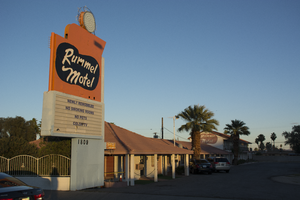
Photographs of Rummel Motel sign, Las Vegas (Nev.), February 23, 2017
Date
Archival Collection
Description
Site address: 1809 S Las Vegas Blvd
Sign owner: Yeh Chia-Hong
Sign details: The motel was founded by Marvin Rummel in 1945 (VintageLasVegas, n.d.), although the Clark County Assessor lists the original construction year as 1951 (Assessor, n.d.). Undated vintage postcards, one describing the motel as "new" (Rummel Motel, 1809 So. 5th St. U.S. 91 - L.A. Highway Las Vegas, Nevada original vintage postcard, n.d.) show that a two-story building was later added to the back of the motor court (VintageLasVegas). The addition may explain the discrepancy in construction dates. The Roles family purchased the property in 1958 (VintageLasVegas; Noted bowler, hotel owner dies, 2002). Ralph Roles also operated the Del Mar Motel (the Del Mar's sign, designed by Betty Willis, is now at the Neon Museum). A vintage postcard from 1958 shows that motel was endorsed by the Automobile Association of America and another automobile club (Garofalo, 2011). The motel was severely damaged by fire on April 30 2017 (VintageLasVegas; Hershkovitz, 2017) and is currently closed.
Sign condition: The condition is 2, fair. The lower portion of the cabinet is dented and access panels are damaged or missing. The upper portions of the cabinet display numerous metal patches. The plastic on the reader board has holes. The remaining neon tubing appears to be intact. All incandescent light bulbs are missing.
Sign form: Pylon sign
Sign-specific description: The sign is supported by a rectangular blue metal pylon. A blue metal-framed reader board and orange metal upper cabinet are cantilevered out from the pylon toward the street. In the center of the upper cabinet is an amoeba-shaped area which is painted black and outlined by white skeleton neon. Inside the black amoeba are individual cursive letters which spell out "Rummel Motel" in white paint traced by white skeleton neon. Atop the upper cabinet is a smaller orange metal cabinet which is wing-shaped. Above the wing is a blue metal circle. Inside the channel of the circle are six concentric circles of empty light sockets. On the outside of the circle is a semi-circular metal frame which holds five white skeleton neon five-pointed stars.
Sign - type of display: Neon, incandescent and reader board
Sign - media: Steel and plastic
Sign - non-neon treatments: Incandescent light bulbs and a reader board
Sign environment: This is located on Las Vegas Boulevard South just north of the Las Vegas Strip
Sign - date of installation: The current sign dates back to at least 1958, but probably is not the original motel sign. A vintage postcard shows that before the two-story addition, the motel had a simple double pole sign with the name "Rummel Motel" enclosed by an open oval (Rummel Motel, 1809 So. 5th St. U.S. 91 - L.A. Highway Las Vegas, Nevada original vintage postcard, n.d.). The colors, lettering style and oval shape of the former sign appear to have inspired the design of the sign seen in a postcard from 1958 (Garofalo, 2011). The latter sign, with heavy modification, is the sign seen on the property today. The sign as currently configured is recognizable in a postcard from the late 1950's or early 1960's (Las Vegas motels then and now, n.d.).
Sign - date of redesign/move: The circa 1958 sign (Garofalo, 2011) was supported by double poles. The pole on the street side of the sign can still be seen on the upper cabinet, but it no longer reaches to the ground. The pole on the motel side of the sign ran from the ground toward the center of the sign, and then doglegged inward toward the motel to support the sign from the side. That pole appears to be the same one now enclosed by the pylon. The shadow of the pole can be seen inside the current reader board, which was a later addition attached below the circa 1958 sign. Automobile club shields at the bottom of the circa 1958 sign have been removed. A black metal directional arrow pointing toward the motel from the street side of the sign has also been removed. A circular white or light yellow metal cabinet with concentric rows of incandescent lightbulbs in the interior and a semi-circle of neon stars on the exterior has been moved from the top of the former directional arrow to the top of the wing-shaped cabinet. The circa 1958 wing-shaped cabinet was flush with the street side of the sign and contained skeleton neon which advertised, "HEATED POOL". The current wing-shaped cabinet contains no neon and has been pushed to the center of the sign. The lower cabinet of the circa 1958 sign was painted orange and black, which is now all orange. The amoeba shape was painted blue and is now black. Below the amoeba were skeleton neon letters which spelled out, "NO VACANCY" and "24 HOUR ROOM SERVICE". The neon is now gone. A small black metal cabinet attached at the bottom of the sign contained what appear to be either painted or skeleton neon letters which state, "COOLED BY REFRIGERATION". That portion of the sign is now gone.
Sign - thematic influences: This sign showcases 1950's and 1960's Googie trends. This also conveys earlier motor court designs in the building and the sign.
Survey - research locations: Clark County Assessor, Parcel No. 162-03-310-007, Retrieved from http://www.clarkcountynv.gov/assessor/Pages/PropertyRecords.aspx?H=redrock&P=assrrealprop/pcl.aspx Garofalo, M. (2011 November 2). Still standing-Rummel Motel. Retrieved from https://www.flickr.com/photos/vintageroadtrip/6304823598/ Hershkovitz, R. (2017 April 30). Fire damages vacant downtown Las Vegas motel. Las Vegas Review Journal. Retrieved from https://www.reviewjournal.com/local/local-las-vegas/downtown/fire-damages-vacant-downtown-las-vegas-motel/ Las Vegas motels-Then and now. (n.d.). Rummel Motel. Retrieved from http://stefanidrivesvegas.com/8.html Noted bowler, motel owner Roles dies. (2002 July 30). Las Vegas Sun. Retrieved from https://lasvegassun.com/news/2002/jul/30/noted-bowler-motel-owner-roles-dies/ RoadsideArchitecture. (n.d.) The Rummel Motel. Retrieved from http://www.roadarch.com/signs/nvvegas3.html Rummel Motel, 1809 So. 5th St. U.S. 91 - L.A. Highway Las Vegas, Nevada original vintage postcard. (n.d.). Retrieved from https://www.amazon.com/Rummel-Motel-1809-So-U-S/dp/B00P9LEQCS VintageLasVegas. (n.d.). Rummel Motel. Retrieved from http://vintagelasvegas.com/post/160953547509/rummel-motel-1809-s-las-vegas-blvd-built-by
Surveyor: Mitchell Cohen
Survey - date completed: 2017-09-18
Sign keywords: Pylon; Neon; Incandescent; Reader board; Plastic; Steel
Mixed Content
The Story of Classic Las Vegas Oral History Interviews
Identifier
Abstract
Archival Collection

